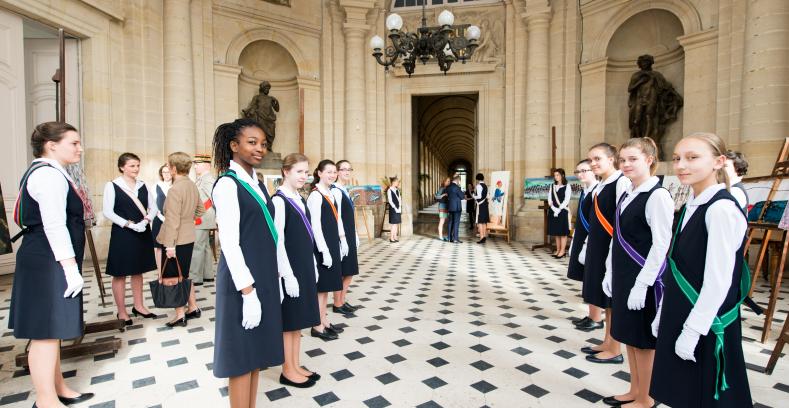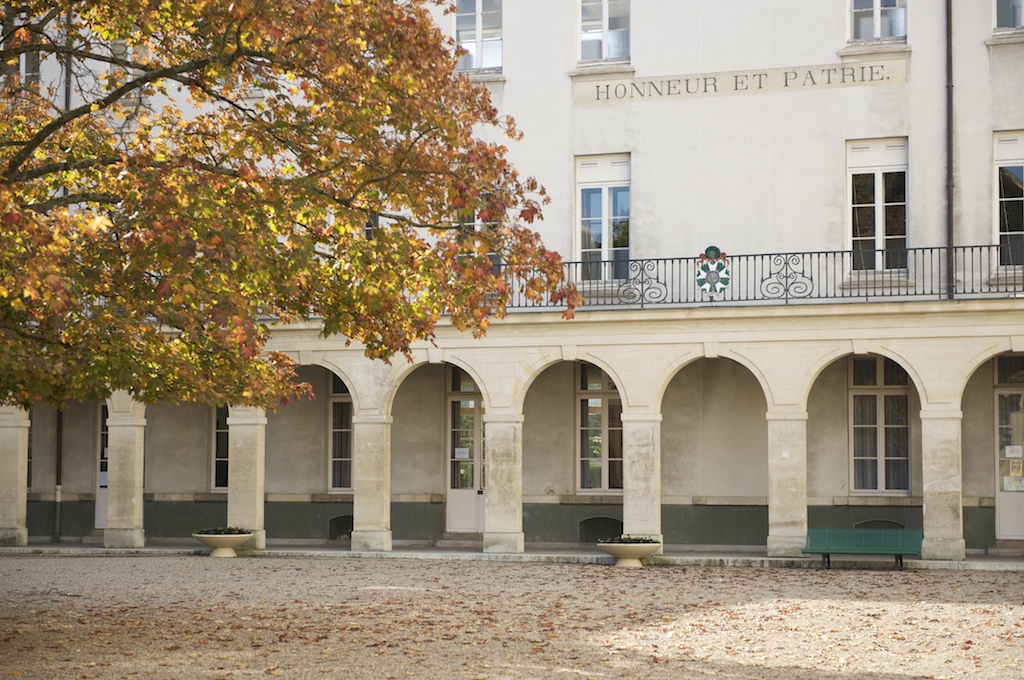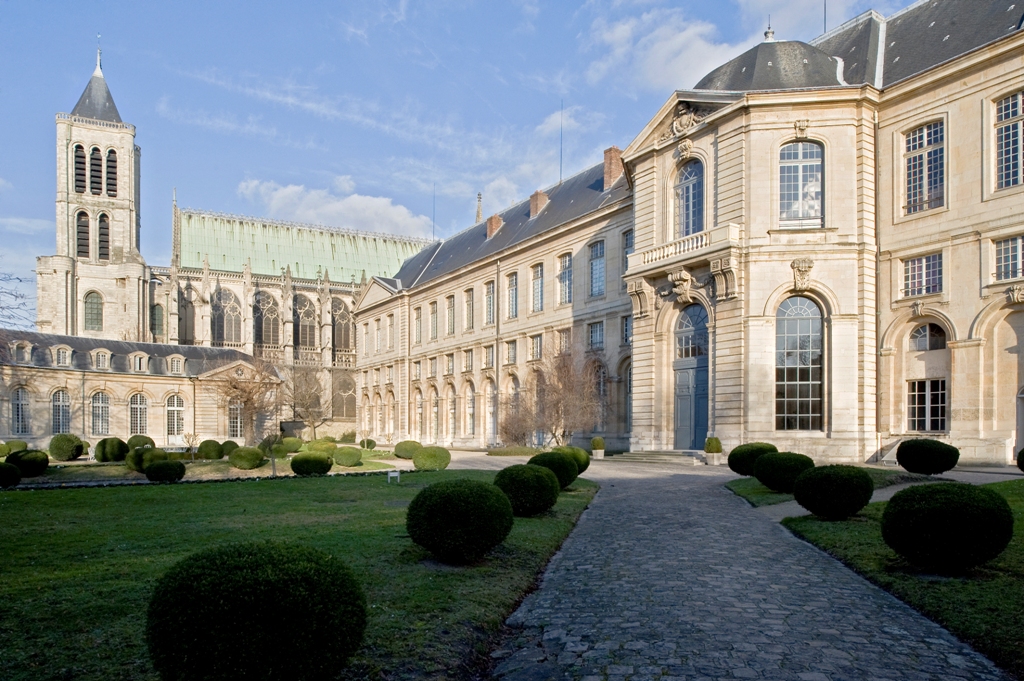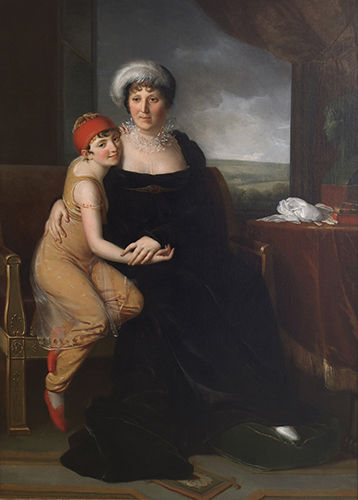
Presenting the maisons d’éducation
The maisons d’éducation of the Legion of Honor are state schools intended for girls who are descendants of honorees. In a successful alliance of tradition and modernity, the schools educate 1000 boarders, from 6th grade to hypokhâgne-khâgne (literary and humanities preparatory course) and BTS (technician certificate).
Location
Situated in history-rich buildings in favored natural settings, the two maisons d’éducation offer exceptional living and working quarters where students can thrive.
- The maison d’éducation des Loges, located in the former convent of Les Loges in the heart of an 8-hectare park in the forest of Saint-Germain-en-Laye, houses 500 lower-level secondary school girls.

- The maison d’éducation de Saint-Denis, located in the former royal abbey of Saint-Denis, a classical art gem surrounded by a 16-hectare park, houses 500 students in lycée (upper-level secondary school), hypokhâgne-khâgne (literary and humanities preparatory course) and BTS in international commerce.

Status
Atypical institutions in the French school system, the maisons d’éducation are placed under the authority of the Grand Chancellor of the Legion of Honor.
They are general education state boarding schools. Teachers are part of the National Education system, and the curriculum they teach complies with the principles and program set by the Ministry of National Education.
Faithful to the motto of the first national order, «Honor and Fatherland», the education they provide is designed to « inspire pupils with love for the fatherland and freedom as well as a sense of civic and family duties, and to prepare them, through academic instruction and character formation, for a dignified and independent life.
Conditions for admission
The maisons d’éducation welcome, solely as boarding students, the daughters, grand-daughters and great-grand-daughters of French and foreign recipients of the Legion of Honor, the Military Medal and the National Order of Merit.
Admission, based on an application and an interview, takes into account a girl’s motivation for boarding school, her family situation and her academic record. The selection process focuses on the pupil’s potential for progress, her dedication to studying and the compatibility of her general attitude with community living.
In compliance with the founding principles of the Legion of Honor, the admission process endeavors to respect:
- Equality, giving the same attention to all applicants and granting financial aid to the less well-off families.
- Universality, ensuring that all socio-professional categories are represented among students.
The maisons d’éducation are open also to descendants of foreign recipients of the Legion of Honor, the Military Medal and the National Order of Merit, which further accentuates the openness and reach of the Institution.
Organization and pedagogical environment
The two educational institutions are placed under the sole authority of the Superintendent, who personally oversees the maison d’éducation de Saint-Denis, while the Intendant oversees the maison d’éducation des Loges.
Under the authority of the head of the respective institution, the chief education advisers (CPEs) are the preferred contacts for students and families. Their mission is to offer the students the best possible conditions for scholastic achievement and personal development.
The chief education advisers are responsible for the school services provided by the “chargées d’éducation » (educational officer , a position specific to the maisons d’éducation), the “assistantes d’éducation” (education assistants and housemistresses) and the student proctors. These services structure the students’ time outside of the classrooms and provide supervision in an educational framework.
The boarding school’s naturally studious environment, personalized educational guidance, small classes (25 students on average), award system and quality of life all contribute to outstanding achievements year after year, with a 100% success rate for the brevet (middle school certificate) and baccalauréat (national high school diploma) diplomas.
A look at history
The maisons d’éducation of the Legion of Honor were created on December 15, 1805, by Napoleon, intent on filling the need for girls’ education, and convinced that women were to have a major role to play in society.
He himself defined the educational program of these future academic institutions, with a view to providing the daughters of civilian and military recipients of the Legion of Honor with “a dignified and independent life”.
Following up on this initial mission statement, the first maison d’éducation opened in the Château d’Ecouen in 1807. Madame Campan, Marie-Antoinette’s former lady-in-waiting and educator of two of the Emperor’s sisters, was appointed as the first Superintendent.

the maisons d’éducation de la Légion d’honneur ©MLH
Satisfied in seeing how his intentions were carried out, the Emperor decreed the creation of a second maison d’éducation in the former abbey of Saint-Denis. The plan was carried forward by the Count of Lacépède, first Grand Chancellor of the Legion of Honor, with the help of Madame du Bouzet, the second Superintendent.
In 1810, the project was completed with three maisons d’orphelines, orphanages for daughters of Legion of Honor members who died in military service. One of these was the maison des Loges, which lived through several reorganizations and finally became a maison d’éducation. The maison d’éducation d’Ecouen closed in 1962, and the Château now houses the national museum of the Renaissance.
Ever since the days of the 3rd Republic, the maisons d’éducation have constantly modernized and gained prestige by dispensing a high standard of education without disowning their egalitarian foundation.
A now two-hundred-year-old institution, the maisons d’éducation of the Legion of Honor have lived through all political regimes, under two emperors, three kings and four republics.